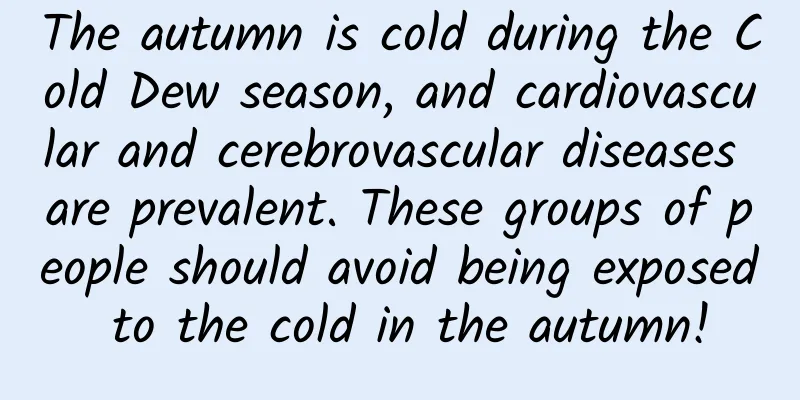The autumn is cold during the Cold Dew season, and cardiovascular and cerebrovascular diseases are prevalent. These groups of people should avoid being exposed to the cold in the autumn!

|
The day of Cold Dew is also the 26th National Hypertension Day. Not long ago, the World Health Organization released the first "Global Hypertension Report", which shows that hypertension affects one-third of adults in the world, and half of hypertensive patients do not know that their blood pressure is high; hypertension can cause stroke, heart attack, heart failure, kidney damage and many other health problems; changing lifestyle, including eating a healthier diet, quitting smoking and increasing physical activity, can help lower blood pressure. The change of seasons and the alternation of cold and warm temperatures can easily cause fluctuations in blood pressure and the occurrence of cardiovascular and cerebrovascular diseases. As the saying goes, "Don't expose your body during the White Dew, and don't expose your feet during the Cold Dew." After the Cold Dew, you should pay attention to keeping your feet warm. Hypertensive patients should pay attention to adding or removing clothes according to the temperature changes, and keep warm. Even if you exercise, you should do it after sunrise when the temperature rises to avoid vascular spasm caused by cold air, which will cause drastic fluctuations in blood pressure. The saying "autumn cold" does not apply to the elderly, children and other people with weak constitutions and patients with cardiovascular and cerebrovascular diseases. In addition, you should pay attention to eating clean food and sleeping long. We should also pay attention to the details of daily life. Facing the sudden drop in temperature, elderly people with cardiovascular and cerebrovascular diseases should pay attention to their bodies and avoid cold weather. After waking up in the morning, leaving the warm bed, the temperature difference is relatively large. If you get up immediately, it is easy to cause postural hypotension, fainting, myocardial insufficiency and other accidents. First, lie down in bed for half a minute after waking up. Stretch your body, but don't get up immediately. Second, sit up and lean against the head of the bed for half a minute. This semi-sitting position puts more pressure on the heart and blood vessels. This is an adaptation process, a warm-up process. Third, let your legs hang down and wait for another half a minute. This is another warm-up to allow the cardiovascular system to adapt to the upright state. *Comprehensive information from Xinhua Daily, Guangming Online, etc. |
<<: When "National Hypertension Day" meets Cold Dew, how can we get through it smoothly?
>>: Don't eat this fruit! "Mycotoxins" are no joke...
Recommend
Can vaginal ultrasound show cervical adhesions?
The symptoms of cervical adhesion are more obviou...
What kind of shoes do girls usually wear when walking?
Shoes are something that everyone has. They can p...
Why is my aunt's blood black?
Some women find that their menstrual blood is gra...
What are the colors of bougainvillea? How to grow bougainvillea in winter
Bougainvillea is a general name for plants of the...
Early ectopic pregnancy B-ultrasound picture
Ectopic pregnancy is a common condition among mod...
Why does pregnant women have oily hair?
Many people find that their hair tends to become ...
Can you eat jujube? What are the taboos of eating jujube?
Many people may be unfamiliar with the jujube, bu...
Is it normal to have pain in the incision 25 days after a cesarean section?
After a cesarean section, mothers must rest in be...
Why do I have abdominal pain after abortion?
After an abortion, a woman's body will become...
What can you do after being infected with AIDS: Early diagnosis and early treatment, the life expectancy of infected people is not much different from that of normal people?
1 Clinically, HIV infection is divided into three...
Why does pus discharge from the vagina?
Vaginitis is a minor disease but it causes great ...
Do you put tea leaves in tea eggs first? When should you put tea leaves in when cooking tea eggs?
We all know that there are many ways to eat eggs,...
Can I take medicine to have an abortion at 50 days of pregnancy?
After 50 days of pregnancy, the baby is basically...
Clotrimazole ointment for the treatment of vaginitis
If the natural environment of a woman's vagin...









